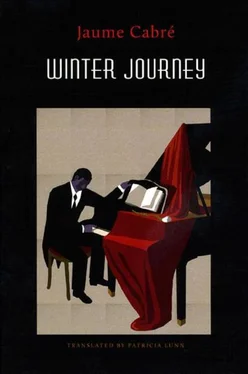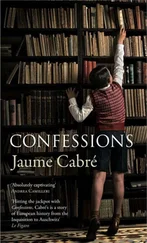To fill the package with something that justifies the voyage, I am sending you a painting that is pretty but of no great value. 1 paid only five hundred florins for it. It is a portrait made of me last spring by Master Rembrandt Marmenszoon van Rijn, a painter who had his days of glory but has now fallen on hard times. Still, I recognize that he has made a pretty thing. The portrait took a great deal of work. The painter came to the house every morning, after Aixer Yotsar, at the time when 1 go over the client list and prepare my correspondence, as 1 do every day but the Sabbath, to take advantage of the morning light that Adonai deigns to grant us daily. Master Rembrandt chose my bedroom, which is now too large and, alas, too lonely, because it has the best light. 1 want you to keep the painting, dear son, not so much for its value, which is slight, but so that you will have, now that 1 know you will never return home because things are going well for you, a reminder of my old self and especially of the room in which your mother gave birth to you many years ago. This is the value it has, my son. Keep it with you and show it to your children and your children's children, that they should think of their poor grandmother. For you it will be a reminder of your origins, for there is no more painful death than the loss of memory.
Baruch Anslo put down the letter and opened up the painting. The portrait of the usurer Maarten going over his Devil's book, looking for the name of the fool to whom he could sell a diamond at three times the fair price, and entering in the profit column the money he took out of my salary for the little brilliant that inexplicably disappeared a year and a half ago.
He stood up and went to the fire. Baruch Anslo felt humiliated by the old man's cunning. After a long hesitation, he broke the other seal and carefully studied the secret lists. By midnight, when the city was white with cold, he had four ideas, but they still needed to be worked out.
He figured out the solution the next day when, though it was the Sabbath, he was out walking disguised as Benedictus Olson, stepping over the dirty snow near the episcopal palace, and Providence decreed that he should stop by a frost-damaged chestnut tree because, Providence be praised, the episcopal coach had stopped by the chestnut on its way into the city. His Excellency Monsignor Johann Christoph Gotz, Defender of the Cross and Bishop of Munster, alighted, accompanied by his secretary. He wanted to take a look at the chestnut, whose health seemed to be a matter of concern to him. He patted the trunk, said something to the secretary, who nodded, and Baruch Benedictus saw them get back into the coach and go to the palace only a hundred yards away. Baruch Benedictus, on seeing His Excellency the Bishop, was stunned, his mouth agape. Now he could think of nothing but finding a good carpenter.
"As you can see, Monsignor," said Baruch, pointing to the easel covered by a sheet requisitioned from the hostel, "Master Rembrandt understood that in order to commemorate his celebrated conversion to Catholicism…"
"I was not aware he had converted."
"News, Monsignor," cut in Baruch Benedictus Anslo Olson, "is always slower than the truth." Before the other could praise the striking beauty of the aphorism, he went on. "The master decided to render homage to His Most Illustrious Excellency Monsignor Gotz."
With studied emphasis he pulled on the sheet, and the episcopal secretary was able to gaze at the canvas, unrolled and displayed on a solid stand and surrounded by a frame that was at once austere and imposing. The monsignor opened his mouth, astonished. He looked at Baruch, looked once again at the canvas, and swallowed.
"But Rembrandt has never been here," he said admiringly. He pointed. "You, sir…"
"Gerrit van Loo, from Weesp," Baruch Benedictus Anslo Olson of Amsterdam continued humbly.
… van Loo, do you know His Excellency?"
"1 have that honor."
"But Rembrandt has never come to Munster!"
"1 am his eyes, Monsignor." He lowered them humbly and went on. "1 was in Munster the day that His Most Illustrious Excellency was enthroned, charged by my master with describing his features to him. When 1 returned to Amsterdam, 1 explained to Master van Rijn what His Excellency looked like, and he decided that, in order to avoid clumsy imperfections, he would make the figure small but surround it with an aura of wisdom and holiness."
"It is a perfect likeness." The episcopal secretary was still in awe.
"With this painting, Master Rembrandt wished to pay homage to all of the sages who, like His Excellency, spend the better part of each day, and even of the night, in the study of philosophy and holy theology, seeking guidance in ancient books full of wisdom." He raised a finger in conclusion. "You should know that Master Rembrandt has read Gotz's entire Tractatus Philosophicus."
"Admirable." In an attack of sincerity, the secretary said, "I was incapable of doing it."
"Do you see?" insisted Baruch Benedictus Gerrit Anslo Olson van Loo. "The book that His Excellency is consulting in the painting is the Summa Theologica of Thomas Aquinas, Accordingly, the true protagonist of the canvas, along with His Excellency Bishop Gotz, is the room itself and its atmosphere." He pointed an expert finger. "This is the reason that much of the painting is dark ochre, and the window, which admits the blazing light sent to us every day by Almighty God, stands out like a point of departure."
"It is truly beautiful."
"Do you see here, Your Reverence? These are the stairs coming down from a kind of ivory tower into the world in which we mortals busy ourselves far from wisdom."
"1 should like to know why you are offering to sell us this painting if…"
"Once it was finished, my master said, Gerrit, my son, this painting has a destination. Go to His Excellency the Bishop of Munster and offer it to him as an homage to this city that has remained Catholic amid such turbulence."
"This is the first painting by Rembrandt that I've seen. Rubens is more talked about here."
"The experts say that Master van Rijn is the only one who knows how to paint air."
It was true. The air in the room, the space, the light, the contrast between dark and light. It was a marvel.
"This seems to me a most generous gesture on your master's part. Tell him that His Most Illustrious Excellency will accept the gift and the homage."
"Well…," said Baruch Benedictus Gerrit Anslo Olson van Loo cautiously, "the master told me that 1 was to offer it to His Most Illustrious Excellency for five thousand Dutch florins, though it is worth three times that."
"Ah." The episcopal secretary looked again at the canvas, well placed by the window. "And what would happen if His Most Illustrious Excellency did not wish to pay this money?"
"With tears in his eyes he told me that if we did not reach an agreement, 1 should travel on to Rome and offer it to the Holy Father Alexander."
"At the same price?"
"At double the price."
The secretary went up to the painting to admire a detail. Then he stepped back a few paces and looked at the whole thing. His eyes shone like jewels.
"What title has your master given it?"
There was a slight hesitation, which Baruch covered up by clearing his throat.
"The Philosopher." He coughed a little more. "The Philosopher Gotz," he finished after the false attack of coughing. "In homage to His Reverence and to his renown as a student of philosophy." For the first time, the secretary left off contemplating the painting and looked Baruch in the eye. Now he understood everything.
2
"In Munster, my friends, I understood the extent of the Catholic rage towards those of other confessions, even those of Christian sects. There are children here, so I cannot describe the horror of the tortures they inflicted a few years ago on the unredeemed Anabaptists, hanging them alive from hooks and condemning them to death from hunger, cold, exposure and thirst."
Читать дальше












